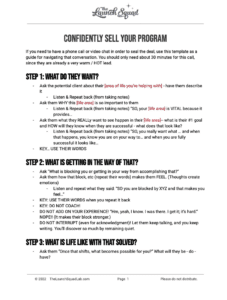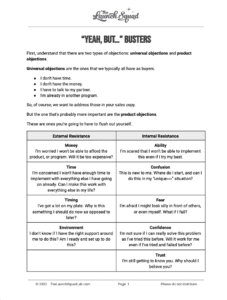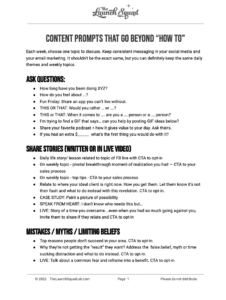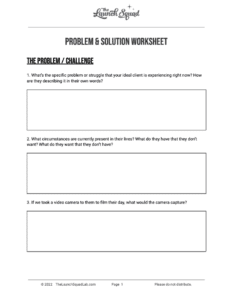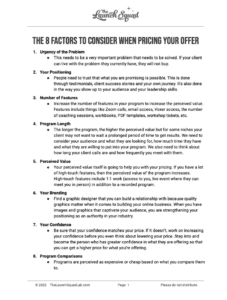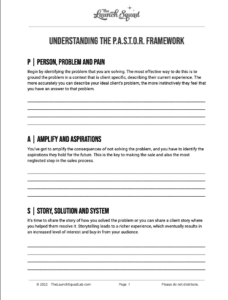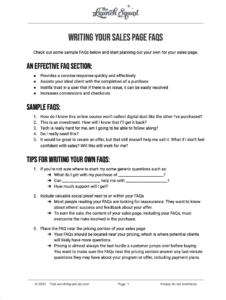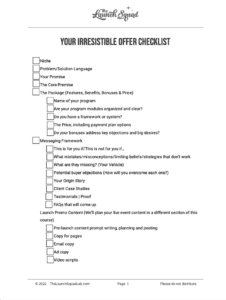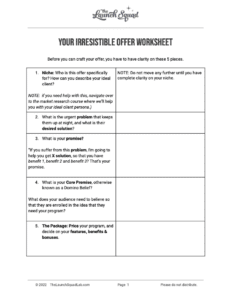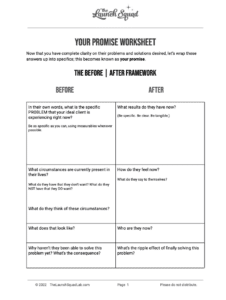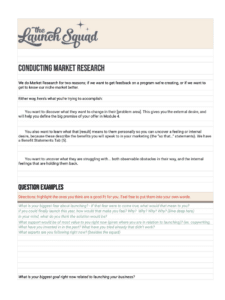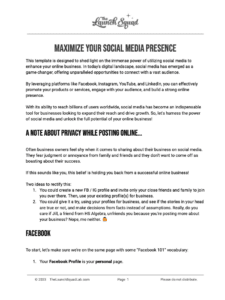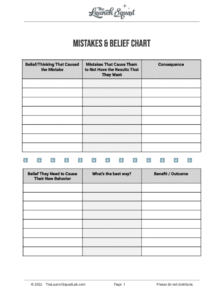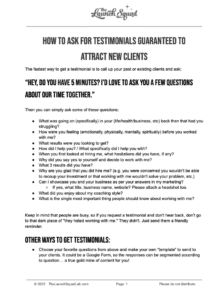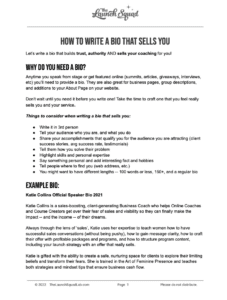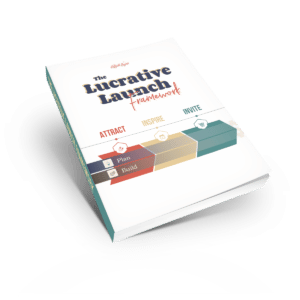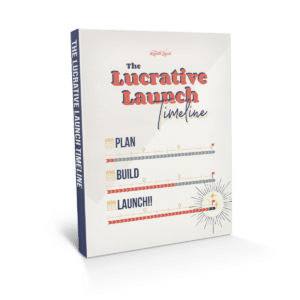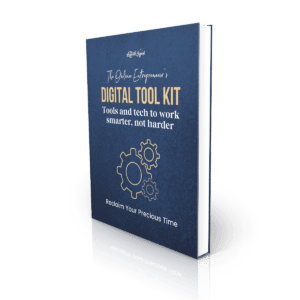In this episode, I’m talking with Allison Miles, our project manager and Launch Liaison. Today, we’re discussing what it takes to hire a stellar team. We talk about when to hire, who to hire first, and much more!
- When are you “ready” to hire?
- Who do you hire first?
- How do you hire for the role, not the skill (or task)?
- How do you find A-players to join your team?
- And much more!
[00:00:00] Jeffrey: Welcome to the light and your launch podcast today, we're talking about building your dream team. Stay tuned.
[00:00:54] Jeffrey: Welcome back to the show. I'm Jeffrey . And today I'm here with a special guest Alison miles, our integrator slash project manager slash coordinators lash, all the things.
[00:01:10] Allison: That about sums it up.
[00:01:11] Jeffrey: Yeah, that's about, that's the official job job title
[00:01:14] Allison: that's the gist.
[00:01:15] Jeffrey: today. We want to talk about how to build a really, really great team. And I feel like we are qualified to talk about this because in my opinion, we have an amazing team.
I love our team. So, right. It feels so good. It feels so good. And I'll tell you this, um, two years ago, two, three years ago, I would not have dreamt that it would be like this. Of course, you know, of course I couldn't. I could not have envisioned or, uh, Put myself in that state of bind of, of knowing what this would feel like, but I knew, and this is kind of what we'll get on today.
I knew that it needed to happen. Right. And really that's, that's the point, the narrative of this podcast is it needs to happen. So how, how do we get this going? So
[00:02:21] Allison: So when to, to touch on that point. So when we first met three years ago, you had, you had never worked with a VA before. And I mean, I had, I had just started my own VA freelance business. And so I think you had reached the point where you knew things could not continue the way. They were at that moment in time, you were doing everything in the business you had had, you had a couple of developers to help on the web, uh, the website and things, but you knew that you were doing way too much on your own.
And when you, in your zone of genius, realize that you were spending so many hours a week doing things outside the Bezos.
[00:03:05] Jeffrey: Right.
[00:03:06] Allison: You have to be honest with yourself and know that it's time to take that next step in your business. You have grown, you've graduated from, you know, grassroots doing everything yourself.
You have no money. And now it's like, no, you have to, you have to make that choice and move forward. If you want your business to succeed and move forward.
[00:03:26] Jeffrey: And that's really, that's really kind of what. Sparked that change in me. Of course. I mean, I listened to podcasts. I listened to leaders. I listened to Coors and I had a lot of people saying the same message over and over and over that message being what we're talking about here, but it really started to sink in when I did have a developer or two and managing them.
And trying to get business and trying to work on the business while trying to work in the business, like it all started to come together. And then I understood what they were talking about when they said, Hey, you need to hire so, so to answer this question of like, when are you ready to hire.
[00:04:18] Allison: Um,
[00:04:19] Jeffrey: The, the, the approach I was start with is what are you sacrificing by doing all yourself?
Right? Because if you think about it, a business needs a visionary. That's you that's, you, you're the, you're the visionary, you're the leader of the business. This is something in right now. You might be consider yourself an entrepreneur, right. But. There's oh, I guess I, Hmm. T to, to make this distinction between business owner and entrepreneur, the idea, the concept of an entrepreneur is that you are doing it yourself.
So.
[00:05:05] Allison: well, and I think, I think some of those terms get, um, They're mostly the same. I think it depends on what your, your end goal is. Like, do you want to build this business? And, and this is your you're solid you're okay. Being a freelancer you're okay. Like you don't need to grow it to a multi-million dollar or like have a team you're okay.
With the way things are. I think in that sense. Yeah. You're a business owner. Your, you can call yourself an entrepreneur or you have made something from the ground up, but. By being that by stepping into a bigger visionary role and that CEO role and, um, that you're striving for growth.
[00:05:49] Jeffrey: Yeah.
[00:05:50] Allison: line is growth, not staying where you are because in your mind, if you stay where you are.
That could be acquainted to failure. And what is all of our deepest fears is failing.
[00:06:04] Jeffrey: Yeah.
[00:06:05] Allison: how I turned that around.
[00:06:06] Jeffrey: Right. You're a failure if you don't grow.
[00:06:09] Allison: Right.
[00:06:10] Jeffrey: No, but I think that is really the bottom line is whatever your vision is, whatever your goal is, you, you, you just make that decision, right. Do you want to be a hundred thousand dollar company? Do, do you just want to make enough? To to get by that's that's okay.
No judgment. Do you want to make more? Are you, uh, are you looking to be a hundred thousand, 200,006, figure seven figure business, right? If that's your goal, if your goal is to grow beyond the hundred K mark, then I guarantee you're going to need a team to do it.
[00:06:49] Allison: without question,
[00:06:50] Jeffrey: you're going to need a team to do it.
So.
[00:06:53] Allison: question. Yeah.
[00:06:54] Jeffrey: that's not you, that's no problem. No judgment. If it is you keep on listening.
[00:07:00] Allison: Yeah. I mean, everybody's got their own path. And I think one of the key points to this episode is being honest with yourself about what your path is. And if you know that you want more and you want to keep growing it, you have to make this choice to, you know, bring somebody on.
And I think we're trying to take the stigma out of. The overwhelm. I'm not an HR professional. I don't know what I'm doing. I suck at interviews. I don't want it. Like, I don't know what questions to ask. Like you don't have to have all those answers. I, you know, and neither one of us are HR professionals and yet we've both hired great people for our teams and we are continuing to succeed.
Um, so I think one of the. Thresholds that you have to look at, like, when is it time to hire? You want to, you want to get to the point of being able to hire before you are reaching burnout
[00:08:04] Jeffrey: Before you think you're ready?
[00:08:06] Allison: before you think you're ready? Because when it's, when you're like, oh my gosh, I'm doing 12 hour days. I'm exhausted.
I need help. Well, you know, now you've got to add another job to your task list of hiring. So get in before you get to that stage and it cause it, you don't need to hire somebody full time. You don't need to hire somebody for even as certain, like a, like a strict number of hours a week. It can just be like, Hey, I need some help as needed.
You can start very slow. That's what we love to do. Um, but you want to know. The way I quantify this, um, for myself, when I am trying to figure out whether I need to hire or not is you have to look at the amount of hours you're spending in your business each week. I just take it out like a weekly amount, just because it's easier to break it down.
That way you look at how many hours you're spending in your business, internal stuff. You know, it could be like banking. It could be getting your, your project management tool set up. It could be managing your email. It could be managing client calls, your internal tasks. How much, how many hours are you spending doing that?
And then how many hours are you spending doing client billables? If you are. Entire week is focused on client billables. And you do not have, let's say you have like less than five hours a week on your own business and to grow it, you need to hire.
[00:09:31] Jeffrey: And I'll add to that too, because like you're saying, there's, there's working in the business. That's non-billable and there's work in the business that is billable, but there's also a third. There's working on the vision of the business. And of course that's not billable either, but if you don't do it, your business isn't going anywhere.
Right. So, okay. Let, let's talk about the excuses we tell ourselves, because I've, I've said them myself. I've said these myself. I can't even count how many times.
[00:10:08] Allison: Multiple
[00:10:09] Jeffrey: Right. And I've heard them. Right. So, so, um, let's see. I want to get to that one last, but uh, no one can do it the way I do it. Right. I said that a million times. And guess what, there are people that can do it better than I can. What?
[00:10:29] Allison: What are the odds?
[00:10:31] Jeffrey: Yeah. And here's the thing like right off the bat, um, to address that one really is that you don't need to fill a role that is your expertise. Right. If you're, if you're a master designer or a painter or, you know, very skilled trade or whatever it is, you don't need to hire for that position.
Right. But I guarantee you, there needs to be somebody to manage your calendar, getting your inbox, or check your email, or, you know, whatever. Like there are other things you do in your business that are not your zone of genius.
[00:11:07] Allison: The whole point of hiring is growing a team of people who are experts in their own field to help supplement you in your
[00:11:16] Jeffrey: T to keep you in your zone of genius.
[00:11:20] Allison: Right. It's to take those things off your plate, because that's not your area, like a master painter should not be worrying about, you know, calendar entries.
[00:11:30] Jeffrey: Right.
[00:11:31] Allison: should not be worrying about the, the, the banking,
[00:11:34] Jeffrey: customer support
[00:11:35] Allison: Right. Right. So stay in your zone so that you can grow.
[00:11:44] Jeffrey: All right. How about this one? I don't have time to train someone.
[00:11:48] Allison: That's a big one, too.
[00:11:50] Jeffrey: Okay. Now going back to, uh, when you read to hire, this is a big one. If you, because you do have to train someone, I mean, you kind of do right. You know, whether whether or not, uh, you hire somebody that comes in and has skills already, um, that, that amount of training is different.
If you're like hiring a bookkeeper, you're not training them how to do their books. You're training them how to, how to be familiar with your books, but you're not training them how to be a bookkeeper. Right. So the amount of training is isn't. Different, but you will have some onboarding and some getting used to use your stuff and your systems and all that kind of stuff.
So that this goes back to when are you ready to hire? You're ready to hire before you're burnt out right
[00:12:35] Allison: Yeah, before you're desperate.
[00:12:37] Jeffrey: Yeah, exactly, exactly. So, so if you're in the, if you're in the point of desperation, you're like, oh my God, I'm overwhelmed. I'm doing 14, 15, 17 hour days. Like, I don't know if this is sustainable.
You were ready to hire a whole long time ago. If you're not there yet, you're likely ready to hire now. Cause there's going to be some onboarding and you want to make it easy, not overwhelming.
[00:13:05] Allison: And I can attest to this a hundred percent because the first time I hired somebody last year, when I hired Ashley, is my VA shout out to Ashley. Who's the best human being in the world, um, where I was in that burnout point. And I was like, I had finally reached like the realization where. I do not have enough.
Like there's only so much of me to go around. I do not have the time to do everything on my task list. I have, it's just like a come to Jesus moment. I have to hire somebody. I have to get some help in here. And now, so just recently I went through just this week, actually. Um, just this morning I officially sent the offer letter.
I hired a new team member and thankfully I'm in a position to wait. I can have Ashley helped train this new person. So once you can get that, that first team member that really integral part of your team like that right-hand person, um, somebody that really knows your business inside and out, they can help take over.
T take the load off, you know, with some of those duties and help onboard the next person. So once you can get that first one done and you get over your anxiety of it, you get over the hump of it, then it, it just, everything just seems so much easier and it starts flowing more than you ever thought possible.
But like, literally just within the last couple of months, when I realized that I needed to hire, I went through all of these excuses. Can I afford it? Do I have the time to do this? I, you know, I need somebody to feel a certain way. And can they do it as well as I do. And then I finally was like all the things and I had to tell my, I had to tell that voice to shut up and remember that I am a CEO, I'm a business owner.
I have a vision and I'm going to make it happen. And you just kind of have to put on your confidence pants and you just have to do it. Because if she keeps
[00:15:02] Jeffrey: It's your, it's your CEO pants. You
[00:15:04] Allison: it's your CEO, it's your CTO pants. If you keep letting like those anxious thoughts take control, it's, it's a major business killer, unfortunately.
And so you just have to, you just have to keep reminding yourself who you are and if you surround yourself with and dream team, then they are also amazing reminders of how far you've come. You know, look at where you were six months ago, a year from now three years ago. Um,
[00:15:32] Jeffrey: And let, let this be. Um, and the other part of surrounding yourself with a team is also surround yourself with mentors, right? And, and let this be that mentor call to say, this is where you're headed. Be prepared.
[00:15:47] Allison: Yup.
[00:15:49] Jeffrey: this brings us to one of my favorite excuses because there's math that we get to do with this.
[00:15:56] Allison: You love this. I love this part too. This was such, this was the eye-opener that I, that I desperately needed.
[00:16:02] Jeffrey: If this doesn't open your eyes, nothing. Well, okay. So this, this excuse is, um, I'll hire someone when I can afford it or slash I can't afford it. Right? People say that all the time. Now I want you to sink in here. This is, this is a cost versus opportunity. Uh, mentality and let's all put our CEO hat on really quick.
And so let's do some math. There are 1080 work hours in a year. That's it? Unless you're working weekends, but let's, we don't wanna do that. So some, yeah. Right. So, so ask yourself, what do you want to make? How much do you. To value your company yet you want to make a million dollars. Well, if you want to make a million dollars, if you want to have a million dollar company, that means so you're the visionary.
You are the leader of the company, your company, you want a million dollar company. Your time is valued at $925. I'm not saying, Hey, this is your paycheck. I'm saying you as the right. Dang. What am I doing?
[00:17:24] Allison: Oh man, I'm doing this all backwards.
[00:17:26] Jeffrey: Right. So your time is valued at $925 an hour. So let's, let's say, um, I'm, I'm, I'm hear this all the time.
I'm not ready for a million dollar company. I'm just trying to break a hundred K. Okay. If your next step is a hundred thousand dollar business, then that means your time is $92. That's it. You're building a business. You are building a hundred K business. Your time in building that business is $92 an hour.
Now, if you're doing $12 an hour tasks, you're losing $80 every hour. You're doing those tasks.
[00:18:12] Allison: Mike drug
[00:18:13] Jeffrey: Yeah. Think about
[00:18:15] Allison: that's huge.
[00:18:16] Jeffrey: See that that's where your vision is not aligned with your actions. Right? If you're saying to yourself, I want a hundred thousand dollar business, but you're doing $12 tasks, your actions are not aligned with your vision.
Right? So that I, I hope that kind of sits with you for a minute.
[00:18:41] Allison: It's I mean, so you and I talked about this when I was first trying to, I mean, you've been a huge mentor for me first and foremost, and I love you for it. And when. A little happy with what was, I, I think last year I was hiring for the first time and I was stuck in the, I can't afford it. And you broke this down for me and literally made me realize that, um, if you take. If you think hiring somebody to take over tasks for you, you're going to, and you're going to end up losing that hourly wage for a client, right?
Because that's immediately what somebody in my position, um, usually goes to, like, I'm going to lose the money. How can I afford to pay them? So let's just say for even number sake, you are, you're getting paid $20 an hour to do it. You hire say a VA to help you with that task. And they're at $10 an hour, you are making $10 an hour on that task.
Cause you, you take home that, that difference between what your client is paying you and what you were paying your VA to do that task. You were taking home to north an hour and you just freed up an hour for yourself to go do my $50 an hour task.
[00:20:00] Jeffrey: Right.
[00:20:01] Allison: You know, you just freed up that time. And you made 10 bucks go get yourself a nice cup of coffee from Starbucks.
Cause we know what those costs now. So it, you know, it's that realization doing? It's just an, it's just simple math. It's just getting out of your head, getting out of those insecurities and those anxieties and realizing them math. And when you do it, it's right there in front of you. It's possible because what you can do in that hour, now you can move your business before.
[00:20:32] Jeffrey: And here's the thing. Like people get caught up in this whole, like hire this word hiring and for a lot of us are. We're not ready to hire employees and take on, you know, the cost of benefits and salaries and insurance and 401k. Like, that's not what we're talking about here. We're definitely talking about private contractors, overseas VA's and stuff like that.
And, and literally the, the range for that kind of assistance. Ranges from anywhere from three to $5 an hour to $20 an hour, $30 an hour, depending on the skillset and on the tasks and stuff like that. So literally starting out, I want you to put this idea in your head, not the hiring an employee and building a multi-billion dollar company.
Like that's not what we're talking about, but. An extra 25 to $50 a week to start out with like an overseas VA who gets paid $5 to $7 to, to check your inbox, to check your calendar to whatever it is. Right. That is like the easiest place to start. Right. So, which brings us to this idea of like, okay, who do you hire first?
Get that. All the time. Who do you hire first? And the first thing I want you to do before you go and start posting job listings is to figure out your org chart, your organizational chart. And really what you're doing is you're just kind of, um, figuring out what roles need to be or can be, um, filled. Right?
Right now you're the solo preneur. All of the roles are your. But get them out on paper so that you can see how much you're doing and when it's all out on paper, then you can, it's a lot easier to say, oh, okay. Well I, oh gosh, I spend a lot of time checking emails and writing invoices. Right. So that's easy to hand off.
Right? So this idea of an org chart is huge. And it's really just to clarify and simplify. Where you want you to be, and then what other people you can bring into your company to, uh, start picking up the slack, basically.
[00:23:11] Allison: Yeah. And I think like, if you even want to go deeper than an org chart, start listing out what you're doing on a day-to-day basis on a weekly basis, on a monthly basis. And think about if you're starting your day and you're already overwhelmed because you know, you have so many tasks on your to-do list.
What are those tasks? If you had somebody today helping you out, what would they be taking over? And how relieved would you feel those tasks is what you need to hire out for? So whether it's a VA, whether it's a project manager, whether it's a web developer, whether it's a graphic designer, social media manager, I mean, the list goes on and on with how many different contractors exist to help for this very purpose.
Um, the rain. It's massive. So I think the first step is figuring out what you're doing on a day-to-day basis and what would make you super happy to not have to do ever,
[00:24:13] Jeffrey: Yes.
[00:24:14] Allison: also admitting to yourself what you're not good at. I am not good at social media. I am not good at automations. I I'm not, that's not my lane.
I know where I Excel and. I want to stay in that area. So I want to hire somebody to manage those other pieces for me, because I know I suck at it and I want my business to not be held back by my weaknesses. Everybody has weaknesses. You're fooling yourself. If you think you can do everything greatly, perfectly, every time it just is not going to happen.
It doesn't exist. So realize that you're human. And figure out, you know, what, we're human shocking. We can't do everything, you know, and really just be honest with yourself about what you need to start passing off. Um, I'm a little bit biased because, um, Little shameless, free marketing here. I run an OBM.
It'd be an agency, a lighthouse. So if you have no pressure, um, yeah, it's fine. Um, so I will bias because I do believe that hiring a VA is a great first step to get the. What a lot of people think are mundane tasks off your plate, you know? And if you're, if you feel like you need to go a step higher and you really need like an ops manager or project manager, then that's great.
You know, like that puts you in an even better position. You know where you want to go with your business. You know that now you have management level tasks to pass off. You have somebody owning an account for you managing that work for you. You just freed up so many hours each week. Um, but I do think getting somebody to take some of those administrative 10, 12, $15 an hour tasks off your plate so that you can focus more on the higher level tasks and.
Pushing your business forward. Do I have the infrastructure in place to go where I want to go? Do I have as a piece, do I have templates? Do I have a project management tool? Do I have graphics? Do I have marketing? Do I have a company vision kit? Do I know the values that I want to instill in my contractors and my clients?
Do I know who my ideal client is? All the things there's. So there's so many things,
[00:26:32] Jeffrey: you can't think about any of those things when it's task after task, after task, after task, when you're stuck in busy work, you are not thinking about any of those things that Alison just listed off in beautiful order.
[00:26:46] Allison: Thank you.
[00:26:48] Jeffrey: And I'll say this, I'll say this. If you're, if you're just starting out, you're still like on the fence about it. I mean, if we, if we haven't convinced you by now, I mean, we just took it. We're just, we're halfway through, um, uh, if you're still on the fence and you're like, wow, I don't know. You know what? I would start handing off, listen, get out of your inbox and stop managing your calendar. First things first, if nothing else just stop. You're going to experience, you'll get a little taste, a little taste of some precious freedom where you get to think, and you get to breathe and you get to start pondering all of those things. Alison just mentioned.
[00:27:32] Allison: Imagine being able to put your phone on, do not to serve and you don't feel guilty.
[00:27:39] Jeffrey: Amen. Amen.
[00:27:41] Allison: I'm still waiting on that tape, but it will. I'm determined.
[00:27:49] Jeffrey: So, uh, I want to talk about, um, this idea of,
oh, what do I talk about first? Let's put this down here. Rearranging my notes. So this idea of hiring slow and firing fast, and the, the concept of this is finding your a players. And part of this, this idea of an a player is basically this Swiss army knife, um, a Swiss army knife person, for lack of. Better term, that's a
[00:28:30] Allison: think you should copyright that. That could be good, handy somewhere.
[00:28:35] Jeffrey: So, so you, as the, as the business owner, you are the visionary, you are the what and the why of the company, of the business, of your brand, right? The visionary, you need to find an intrepreneur or integrator or Swiss army knife. That's going to be the who and the ha. Right. The visionary says, this is what we needed to do and why, and the, your Swiss army knife, he says, cool.
I'll find someone to do it and I'll figure out how they're going to do it.
[00:29:08] Allison: uh huh.
[00:29:09] Jeffrey: And so keep that idea in mind, as you go into hiring. And this is the idea of hiring slow and firing fast. You're looking for people who are taking initiative, who are motivated. They've got a team mentality, they've got an idea of like, you know what, I'll figure it out.
Right? That's their, that's their slogan. I'll figure it out. You give me a task. I'll figure it out. No problem. And
[00:29:38] Allison: And I think to piggyback on that really quickly, cause I've seen some, uh, CEOs, they want to find that perfect person I'm gonna, I'm gonna. I have to just blow that up a little bit. Cause that doesn't exist. That perfect person doesn't exist. There is no one human being that knows everything you want them to know.
So instead of putting all that pressure on yourself to find that person and that person being interviewed to be somebody that they may never be able to live up to because you've created this, this like impossible vision in your head of what you want them to do, you want to find the person that. Knows how to figure things out.
They, they're not just going to say, well, I don't know how to do that. Okay. But then configure it out. Like I'm not, I can't expect you to know all the things that's impossible. Um, but know enough to know how to utilize Google. So for media, the, the, the internet, the interwebs is, is infinite. As we all know, Sometimes we're scared of it, but the answers are there.
So just go find them, right. So don't expect to get all, like, don't expect to find this unicorn of a person that's going to solve all your problems right off the bat because they know everything they're not going to. So I think finding that Swiss army knife, somebody who has that mentality of I'm going to figure this out.
That's huge, but you can't teach that you have to just, they have to have that. Direction within themselves. They have to have that self-discipline and that initiative that's what your height. That's what you're asking these questions for the interview to find out if they are that person, if they are just going to sit back and wait for things to happen, that's not what you want.
[00:31:23] Jeffrey: Right. And if they're, if they're timid about failing, if they're worried about failing, if they're, um, afraid to fail. They're probably not going to fit. Right. A players say, I'm going to give this a go. I'm going to give it the old college try. And I'm going to figure this out. And if I fail I'll I'll know that I'll know how to do it.
Right, right. And they're not afraid to do it. And as a, as a business owner, Don't expect perfection and don't expect them to, uh, to get it right the first time. And I guess what I'm saying is create an open space and a safe space so that they know that their job's not on the line with every task they do. Right. I guess that's kind of like a whole nother. A whole nother podcast about being, you know, management and being a leader instead of an employer. Right. Um, but yeah, th that, I, I think it's important to take your time getting to know people, getting to know a contractor, giving them a time to. I think that anytime you meet somebody, even not even an interview, but let's say you're at a party or whatever, you got to work on a team or something.
Anytime you meet someone new there's, there's the stage of, I'm going to show you what I want you to see. Then there's the stage of, okay. I'll show you a little bit more. And then there's the schist stage of, okay. Here's who I really am.
[00:33:17] Allison: Here's the real me. So I call that party manners. So everybody's on their best party manners when you first meet, right? It's like, or like church manners, whatever you want to call it. But it's, you're showing like the best professional, like the outward leap, you know, version of yourself that you want people to see, not the version of yourself sitting at home.
In your, in your pain, you know, in your sweatpants and bingeing, popcorn, whatever, you don't want them to see that.
[00:33:43] Jeffrey: Let's see what you do on your spare time.
[00:33:45] Allison: Right. Exactly. Nobody needs to see that it's a very intimate level, but you're always on you're on your best behavior when you first meet, because you're never quite sure like what some triggers might be like, if you, you know, if you say something about the other person that might not be.
You know, funny or professional or whatever the case may be is you're just feeling each other out. You just it's. Whether you're whether it's a friend, whether it's a relationship, whether it's a coworker, a client networking event, whatever the case is, you're feeling each other out that takes time sometimes.
In your gut, you just know that this person is somebody that you want to just spend a lot of time with, or you want them, you just want to know them. You can feel that in your gut sometimes. Um, and I love those kinds of people. I love those feelings. Um, and they're, cause they're just very open and real and raw.
And I love that some people are a little bit slower to come out. Um, but they do. And I think. I don't think either one is bad. I really don't. I think that there are, there are diamonds in both of those scenarios. It just depends on what you're, what you're looking for. Um, and, and how that relationship hands out.
But, um, I definitely agree with hiring. I've never heard this before, hiring Sloan firing fast, but I love it because on the opposite side of this is firing fast, which is like, has a, could have a negative connotation. People are like, oh my God, that sounds terrible. You sound like such a jerk, but no, it's true.
If you have somebody on your team, That you know is not the right fit it. They may not be doing the best job. It may be personality thing. It doesn't matter what the problem is. If there is a problem and this happens more often than not, you know, you have to be honest with, with yourself in with them and decide, is this worth more of my time to try to fix this?
Or can I. You know, cut bait and, and find another, uh, player for this. Um, instead of keeping them on, cause I've seen this happen with some clients where they are just so afraid to have that conversation and they're so free to let somebody go. And they spend so much time either trying to train or fix or motivate somebody.
I'm like, I literally have this with a client couple of years ago. They're trying to motivate somebody to do a better job. And I'm like, you can't motive. You, you can't teach, like you can't force somebody to do a better job. They're either going to do it or they're not. And if they're not, then you have to, you have to just.
[00:36:22] Jeffrey: Right.
[00:36:23] Allison: know, you just don't have anything linger, just do your business, you know, what's right for you and your business. There's just make the choice. And that's why your CEO, you have to make some of those tough calls is not always fun. Um, but you will find, but that's going to open up that position for somebody better.
[00:36:41] Jeffrey: Yeah, and this, this brings up, our next point is to hire for the role, not the skill or the task. And what we mean by that is skills. Skills can be taught. Skills can be taught and, um, personality can't.
[00:36:59] Allison: Nope.
[00:37:00] Jeffrey: People. Yeah, people are going to show up with their personality and that's the one they have. That's that's the one they
[00:37:06] Allison: That's it.
[00:37:07] Jeffrey: So, so one of the tricks we like to do, and this is not everybody's cup of tea, but, um, I'll explain how this plays in. We like to, uh, tell our, our hires, our prospective contractors to take a personality test. And we're not trying to box people in. We're not trying to define them. We're just trying to find where they fit with the rest of the team. Right. Because as an entrepreneur, if I am a, if I'm, if I'm a thinker, I'm not very emotional I'm um, well, let's put it. Here's a perfect example. Let's say you're hiring for, um, uh, a customer support role. Right? And you tell people that don't go take a Myers-Briggs and one's a ENF P and one's an IMTJ right.
Basically one's an extroverted feeler, and one's an introverted thinker. W which one do you think is going to be happier? In a supportive role, empathizing with clients, talking with client customers and supporting them when they're coming to you with a problem, right. The introverted thinker or the extroverted feeler, right.
Which one's going to be happier doing that role. Right. So that's where this comes in. And like, you want to know what role you want to. And then come at it with who's a good fit. And here's the thing you're not, it's not about just putting somebody in the seat. It's also about what role is going to light this person up. They want to do something.
[00:39:10] Allison: absolutely. It's about putting the right person in the right seat. Um, I Fe I got that quote from a book called traction by Gino Wickman. Um, and it was really. Eye-opening um, because it was a very honest take on hiring you. Don't just, some people feel like, oh, I just need somebody. I just need a living, breathing person.
I'm like, no, actually you don't. You really don't because then your turnover is going to be through the roof and that's going to create more problems. If there's anything I hate more than I hate turnover. I hate the concept of it, because if you just take your time with it and do this correctly, the first time out the gate, you don't have to worry about turnover. you find the right person, if you take your time, learning how they operate, what their mindset is, what they want. Like. If they are just looking for a job, they're going to, they're going to be so excited with whatever you throw their right, but find out what their goal is, what their, what their future plans are personally and professionally, you know, find out like, what do you want to do this year?
What do you want to do in five years? What do you want your life to look like five to 10 years from now? And I know that that could be a very vague question because some people are like, I don't even know what my life will look like next week, but, but they should have an idea. Of where they want to go personally and professionally, do they want to stay in this field?
Do they want to do something completely different? Do they want to go overseas? Do they want to, you know, live off the grid that might interfere with your business? So be very honest with each other and it's not, there's no judgment being passed. It's just having that honesty right out the gate so that, you know, is this right for me?
And is it right for you? Hiring is a two way street. It goes both ways. You want both parties to be fulfilled and satisfied by this partnership. It is a partnership and this is why I'm so adamant about contractor relationships. And employee situation, because as an employee, they're going to clock in, they're going to clock out.
I mean, we've all left that world for a reason. We want to build something fulfilling. We want to have people in that business that are also in it for positive reasons. They're not just in it to collect a paycheck.
[00:41:29] Jeffrey: Right. And, and, and to, to piggyback off that you left to chances are, if you're an entrepreneur you left. you don't want to create the same environment you left for someone else. Right?
[00:41:41] Allison: Absolutely.
[00:41:42] Jeffrey: I hated being an employee now. How do I get my employees,
[00:41:46] Allison: Right. How do I get them to work harder?
[00:41:48] Jeffrey: Yeah. How can I squeeze every penny yet? No.
[00:41:53] Allison: Right. That's who I want to work for. Um, yeah, so I think, um, I mean, when I just went through my recent hiring, um, uh, Event this week. Um, I thought of, I thought really long and hard about who I wanted, like the kind of personality traits I was looking for. And personality tests are just one, one piece of the entire hiring model.
It there's so much more that goes into it. It's the job scope. It's how many hours what's the budget. It's,
[00:42:25] Jeffrey: What's their experience. What's
[00:42:27] Allison: What's their experience.
[00:42:28] Jeffrey: them up to do? Like, are they techie? Are they not techie? Do they love that stuff? Do they hate that stuff? Yeah.
[00:42:35] Allison: Do they want to be client facing or do they want to be in the background? Do they, do they, are they okay doing zoom calls? Do they want to, do they want to be in a team environment? Do they want to work solo? There's so many different attributes, but what I realized is like, I, I wanted to hire somebody that was like-minded to me. And if anybody knows me, not exactly introverted. So I wanted somebody that had that same personality with, that had that same mindset that I'm going to figure this out. Give me something like I basically, I want to pass something off to them to own. I don't want to come back to you. I don't want to babysit you.
I ain't got time for that. You don't want me to babysit you because you didn't get into the shop to be babysat. So I'm going to give you a project you're going to. You're going to make it just however it needs to get done, just do it. And I wanted somebody who wanted that as well. And so somebody who needs guidance a lot, somebody who, who wants to be delegated to doesn't want to take that initiative, not the right person for this particular role that I was hiring.
So I was really looking for somebody that was like minded to me, not opposite. Now, flip that around when you and I met. You were looking for somebody opposite and you and I are quite opposite when it comes to like how our brains operate, which I, this is why I find all of this. So fascinating is getting, just learning somebody, just learning how somebody works and operates, not trying to fit somebody into the mold that you want them to be in finding the right person that wants to be what you, what you need them to be.
Um, it goes both ways. And so like, I am. The extrovert I'm the commander personality type is basically what, and, and you are the creative thinker personality. I don't remember what your,
[00:44:35] Jeffrey: You're the dominatrix and I'm the. Wait is Dominic's just the right word. No. Oh gosh, no, that's not the word. That's not the word. Um, there's another word I was thinking of
[00:44:53] Allison: Oh, God, you should. Yeah. You just take this in a new direction. All right. We'll see you next week. Oh, that was good. Um, I know, right? Yeah. Let's stick with those two. That works better, but that sounds better. Oh God, that was funny. Um, yes. And so when we did this, when, when you asked me to do the personality. That was actually the first time I had taken it. And I really, I saw it written down what I was, and I know how silly that sounds, but it was so eye opening for me because I'm like, oh my God.
I'm like, somebody gets me, somebody understands how my brain works and what I want in my life and how I operate things both personally and professionally. Um, and I did, I mean at Neil's moment, it just. It nailed me to a T. So, um, that was really, really amazing for me to, to see that result. And so since then, I've I think that, that conversation, having that conversation with somebody along with asking those very honest, specific questions about what somebody wants for themselves, for their life, for their career, all super, super cool.
Hmm.
[00:46:11] Jeffrey: It is.
[00:46:14] Allison: Okay. And then I think our last full topic is how to find those A-players.
[00:46:23] Jeffrey: I'm sure. That's the question on everybody's mind? They're like, okay, great. Yeah. Let's find an, a player and a Swiss army lives. How do we do that? How do we do that? So where do we start? Alison
[00:46:34] Allison: What I've done, what I've done. Um, and I've had great success with it. Um, I honestly, I've just used Upwork. That's how I have found the two team members. Uh, and, and that I've hired myself. And, um, when I'm looking at, um, well, first of all, so when you're posting the job, when you're writing up the job description, you want it to catch somebody's eye.
You don't want it to just be like a copy paste job. That anybody like you want somebody to respond to it like, wow, I can really see your personality coming out. I can see the kind of manager you are. I can see what your goals are and what your vision is. And I want to be a part of that. Like, please let me be a part of that.
So get creative with the job listing, get as specific as you can so that you can have people when they start sending in proposals or sending in their job applications. It gives them something to respond to and react to, and they can say, I'm so glad you mentioned this specific task or project or key quality that you're looking for because I have done a, B and C, um, and it allows them.
It gives them that permission to kind of get even more specific and creative with their applications as well. But in this, um, uh, this past, uh, A few weeks when I was hiring. Um, and I was going through drop proposals. Um, you know, there were, there were a handful that caught my eye. Some of them went to my website.
Some of them really read that job description and like made some, you know, special shout outs to staff and references to things like that showed me that they read it. Wasn't just like a copy paste job application. It was a, Hey I've, I've researched you. I've researched your company. I want to be a part of this.
Um, if some of like, I put a little humor in my job application, like my job posts listings, um, because I want them to see like, you're, I'm not the average boss and I try not to be, I lead with humor. I lead with love. That is what I do. And I, you know, hope the same for, you know, I want the same for whoever's on my team.
Um,
[00:48:51] Jeffrey: If they're looking for a corporate job there, you know, that's not the person we want to
[00:48:55] Allison: No, no, don't let the door hit you on the way out. This is not what this job is. Um, so I have a little bit of humor and just like working this in my job listings, just so that they can get a sense of my personality. Um, and they'll put it right back in the, in the, in the proposal and I love it. And that's, what's going to make me say, I want to talk to this person.
Um, so I had, um, Ashley helped me with the screening. She did the first round of interviews. There were only like a handful. I think she did four or five. I got like 20 proposals. I mean, you, you don't want to spend all of your time interviewing. You really want to look at the proposals, look at what they've given you.
And for the ones that stand out that's.
[00:49:37] Jeffrey: And you can, and when it comes to being creative and your job listings, you can start narrowing it down by having them jump through a few hoops. Right. It sounds kind of weird, but you know, if you, if you say, uh, at the, you know, towards the bottom of the listing, you know, uh, in order to apply, please go fill out this form.
Or, um, when you, when you're applying, put this secret word in the headline or something like that, like if it doesn't have that secret word, it's automatically a no, they didn't read your listing. Right. They didn't read it.
[00:50:11] Allison: Exactly. Yeah. Cause I mean, you do have bots out there that are just like hitting respond to some of these listings or like you said, you have somebody who just is doing like a copy paste job application. They're not actually reading what you wrote and you want somebody to take the time to read what you took the time to write.
[00:50:30] Jeffrey: Amen. Yeah. And another thing I like to do, going back to the hiring slow idea is to give them some trial tasks and, you know, have them actually work on a project and to really get to know their work and, and what it's like to work with them. And. Um, and stuff like that right before you even say, yep, this is a good, this is good to go.
You're part of the team, you know, just start out with like, Hey, do these, do these few tasks and let's see how they work. Right.
[00:51:00] Allison: Yeah. It's like a trial task. Yeah. Yeah. It's a trial task. It can bake, you know, you can make it like a week or two. Um, and you can see their kind of work. You can see their response time. Do they ask questions as they're going through? Um, are they not responsive? You know, and then another thing you can also ask them is.
What kind of clients they enjoy working with and what kind of clients they do not enjoy working with? Um, that's a big one too. Um, you know, whether it's personality, whether it's, you know, timeliness, um, you know, do they approach things in a certain way that you don't like, are they aggressive? Are they, are they passive aggressive?
Do you want them to be a little bit more hands-on do you want them to be a hands-off you know, Everybody has their preference. And so, again, that just, again, takes us back to you. This is not a one-way hiring activity. You're not hiring somebody. Somebody else is trying to get a job in a, in a position that where they can thrive and you want them to thrive because if they're thriving, you're not going to have to replace them very soon.
You're going to be able to keep them in your business, whether in that role or in a bigger role later on. You wanna, you want to reduce turnover as much as humanly possible. So do the work upfront. And part of that is, is, you know, putting your, um, so like as far as like job platforms, um, hiring platforms again, I use Upwork, um,
[00:52:34] Jeffrey: It could be Craigslist for all, you know, for, for any
[00:52:37] Allison: You know, it could be, I've seen crazier things happen on critics. Um, there's a lot of, there's a lot of remote job platforms out there. Um, I mean, just start Googling it. There's, there's literally a million of them. Um, cause when, when I first got started and when the pandemic started, I really, um, I signed up for a few of them as well.
[00:53:01] Jeffrey: Online jobs.ph has a great overseas place to start. Good place to
[00:53:05] Allison: Absolutely. Um, so yeah, so get creative with your job listings, be prepared to ask the difficult questions, either in that job listing and have that, like, I love asking screening questions so that it's not all waiting for the, for the interview, like see how they respond. Do they respond with, to. Do they actually put depth and detail into their questions?
Do they export to their answers, to their answers? Do they expand on those answers?
[00:53:35] Jeffrey: Are they
[00:53:35] Allison: want the ones who expand.
[00:53:37] Jeffrey: and.
[00:53:37] Allison: Yeah.
[00:53:39] Jeffrey: coming through because ultimately you're going to be working with this person and going back to like that personality testing and stuff, you're finding a fit for the team, or if you're, if this is your first hire your eventual team. Right. So it's, it is about finding B, B, B, uh, how do you say, um, Be discerning, right.
You're looking for a fit, someone you want to work with a long time. Um, and I like, I like your final point here of going with your gut. Like that, that that's really ultimately what it comes down to.
[00:54:18] Allison: that's what it comes down to. That is how I made these last two hires because, um, I met, I met with them on zoom and immediately I was like, okay. Yep, this is, this is it. And it's, if only I could have that same experience in the dating world, that would be great too. Um, just had to throw that in there.
[00:54:42] Jeffrey: Yeah, the good doesn't work over there for some
[00:54:44] Allison: No, they get doesn't work. No, the gut only works professionally, which is fine. That's what's paying the bills. Um, but no, go with your gut because if somebody, somebody may not have all the experiences. That doesn't mean that they're a bad candidate. If they have those attributes, if they have that mentality that go get or mentality.
Um, and one of the ways I find that out, I asked them like, if, if I give you something that you're not familiar with, if I give you a project you have never done before, how do you approach it? What do you start with? And the ones who say like they'll research five different platforms. They'll, they'll find the answers.
They'll make it happen. You know, I'm like, yeah, that's who I want. Um, I don't want somebody to say, well, I'll just ask you. I'm like, no, I don't. What if I'm not available? What if nobody's available to answer your questions? And this has to get done. Like, I don't, I'd hate for you to be put in that position when you first start with me, but it happens what happens, you know,
[00:55:41] Jeffrey: eventually happen.
[00:55:43] Allison: it'll eventually happen.
So, so you want somebody who can, can take the reins and they know this has to get done. Th the end result looks like this. I'll make it. That mentality is what you want. And so when I, so then if I'm seeing these answers in those screening questions and I'm like, yes, so far on paper, this person looks great.
Let's meet. And just see if personality wise. If it's a match. And so I meet on, I get on zoom with him and I can just buy the T you know, by the way that we're talking with each other, if there's laughter, if there's like fun comradery going back and forth, um, if, if I'm asking additional questions to go a little bit deeper and they're able to, um, respond well, just like on the fly it's it's like, it's a no brainer for me.
And that's where my gut really comes in. Um, You know, you could feel like within two minutes of the call, you know, you know, whether you want them or you don't. Um, and if it feels like a match and you feel like, okay, somehow I need this person in my life, in my business. I need their brain here with me, then hire them
[00:57:02] Jeffrey: Don't wait another
[00:57:03] Allison: go.
Don't wait another minute.
[00:57:05] Jeffrey: hire them and pay them. Well.
[00:57:08] Allison: Absolutely. That's a whole other podcast too.
[00:57:12] Jeffrey: All right. To recap this, let's wrap this up in a boat here. Basically one you want to hire before you think you're ready to, you want to stop the excuses three. You want to get out of your inbox and your calendar for the love of God. Get out of there. Four, spend some time getting to know each contractor slowly, get to know them, feel them out, who they are, what they want to. Higher for the role, not the task. And don't be timid about finding a players. They're the ones that are going to stick with you. They're the ones that are going to make your team better. And they're the ones that are going to grow with you. last words, Alison, on this one?
[00:57:58] Allison: You covered it.
[00:58:00] Jeffrey: Awesome. Well, that's a wrap. Thank you guys for joining us. And if you join this, uh, and food. Thanks for joining us. If you enjoyed this episode, please leave a five star review and hit that subscribe button and you can check out all the show notes and some links will pop in the show [email protected] forward slash episode 73.
We'll see you next time.
Be the first to know
Enter your name and email and we'll let you know when new episodes release.
About the Show
The Lighten Your Launch Podcast is for Coaches and Course Creators who want a lighter online launch experience. Maybe you’ve done a few launches already, and feel exhausted just thinking about it! Or, it’s been one of your goals, but you don’t know where to start.
Tune in to learn from our team of experts, The Launch Squad, who aren’t afraid to dig into all aspects of launching: sales, strategy, technology, mindset, funnels, and even a bit of woo to get you through the toughest times. Let’s put a stop to perfectionism and procrastination, and finally take your launch from intimidating to money-making!





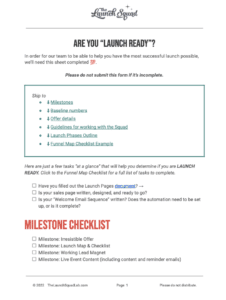
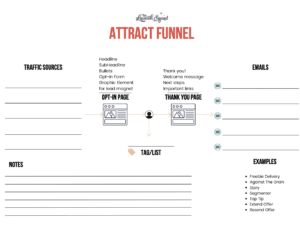
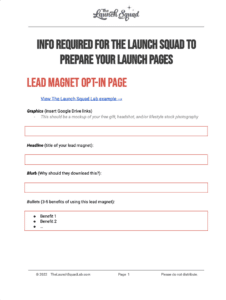
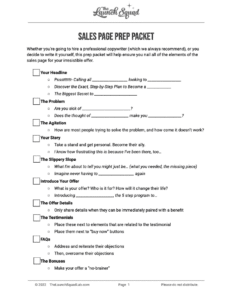
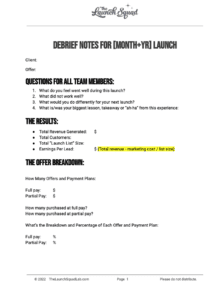
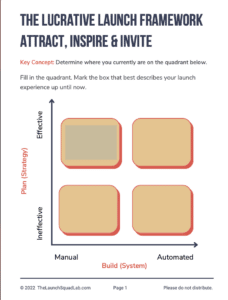
![Marketing Launch Calendar [TEMPLATE]](https://thelaunchsquadlab.com/wp-content/uploads/2023/05/Marketing-Launch-Calendar-TEMPLATE-300x260.png)
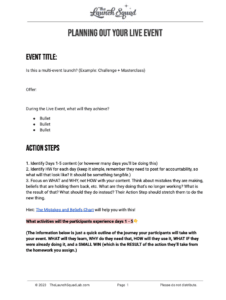

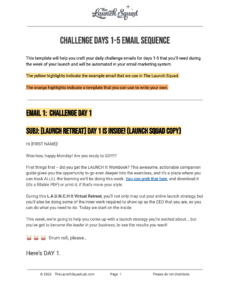
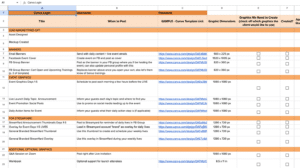
![[Updated] Email Templates for Launch](https://thelaunchsquadlab.com/wp-content/uploads/2023/05/Updated-Email-Templates-for-Launch-223x300.png)
![[REVISED] LS Pitch Script](https://thelaunchsquadlab.com/wp-content/uploads/2023/05/REVISED-LS-Pitch-Script-2023-226x300.png)

